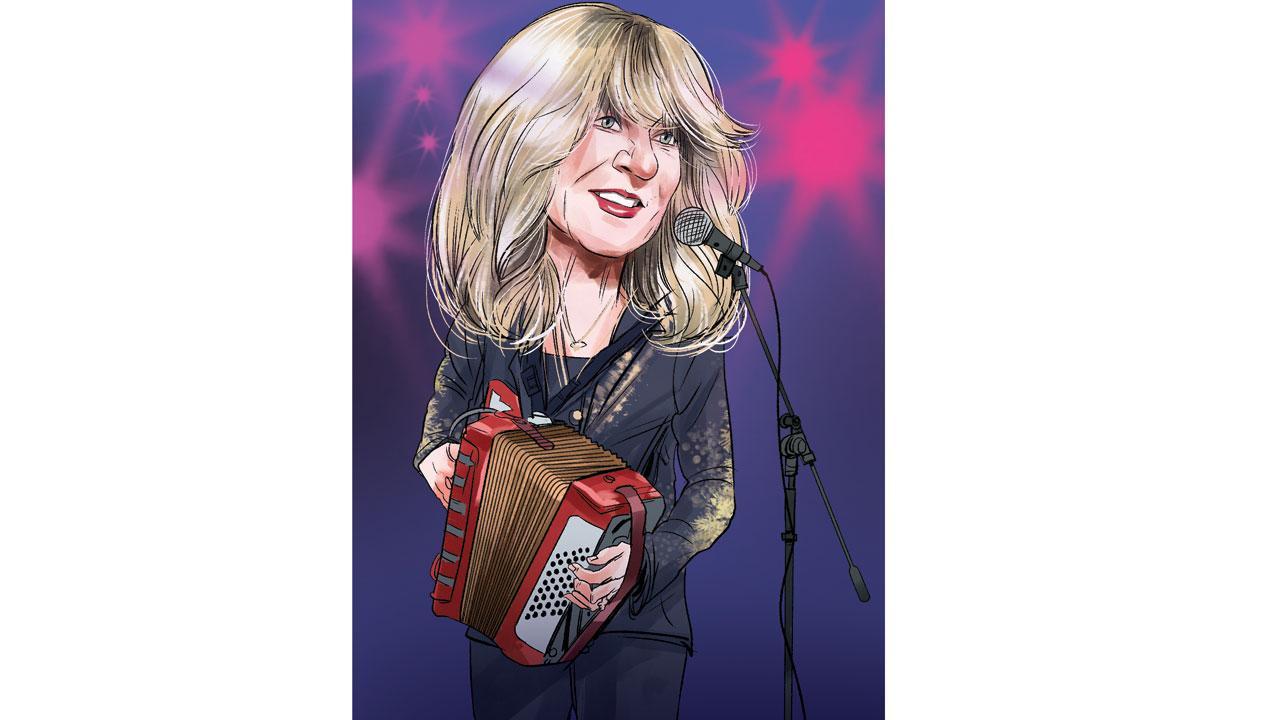The song became Bill Clinton’s ’92 campaign theme song—“it perfectly captured the mood of a nation eager for better days

Illustration/Uday Mohite
 I first heard Christine McVie in 1978, on a set of headphones at the erstwhile Rhythm House. And she’s stayed my top female voice over the years.
I first heard Christine McVie in 1978, on a set of headphones at the erstwhile Rhythm House. And she’s stayed my top female voice over the years.
ADVERTISEMENT
Fleetwood Mac’s Rumours had hit the charts, and each song was an earworm. It was a boppy track, on the album called Don’t Stop, that first caught my fancy—
Don’t stop thinking about tomorrow,
Don’t stop, it’ll soon be here,
It’ll be better than before,
Yesterday’s gone,
yesterday’s gone.
Out of context it was a cheesy song, nothing straight out unconventional, but it had one unique concept, verse one was sung by a male vocalist, verse two by a female, verse three, combined both. I’d never heard that before, it gave music a new mixed flavour.
The song became Bill Clinton’s ’92 campaign theme song—“it perfectly captured the mood of a nation eager for better days. I’m grateful to Christine & Fleetwood Mac for entrusting us with such a meaningful song. I will miss her,” the ex-US President tweeted.
Fleetwood Mac was a band where male and female energies intermingled, with a certain Christine McVie on vocals. She had a silken quality I’d never heard before—I’d always had a complicated relationship with women singers, till that point. Being a true blue rocker with leanings towards heavy metal, pop and folk were never my thing—and women tended to populate the pop genre back in the 1970s and ’80s.
And then, Fleetwood Mac popped onto my horizon. A band with not just one, but two female vocalists—two distinct singers, of differing tones, and timbres, McVie and Stevie Nicks.
I’d shunned love songs till then, ballads were restricted to the men, but these two with their edgy elegance turned love to lust and pain into sheer poetry, with no self-pity.
It was these two women, Christine McVie and Stevie Nicks, a sisterhood that supported each other, in the band, and influenced generations of women musicians that came after… Belinda Carlisle, the Bangles and Sheryl Crow being a few.
What made Christine McVie so special was that she combined sass with purity—she was no diva like Diana Ross, no dazzling superstar, no “drug drenched” Janis Joplin, no female vocalist in an otherwise male band like Debbie Harry—but she had chutzpah, she had cheek, she had a chuckle, she had velvet to go with the vibrato. She forged her path in a mostly male outfit, and then a solo career of great proportions.
She wrote a song, You Make Loving Fun, about her steamy affair with the lighting designer of Fleetwood Mac; her husband, also a band member, curiously asked her who she’d dedicated it to. “It’s about my dog”, she said, poker faced.
Rumours had everything— in-studio brilliance, off-stage drama, broken marriages, adultery.
Never before in the history of music, was there an album, a voyeuristic vinyl, people writing songs about each other, this was a he said-she said, romantic confessional, but the sound stayed untainted, largely because of Christine McVie’s voice and musicality.
Great songs have this one commonality, they stand the test of time, the earworm quality makes you hum a song with the same passion as when you first heard it.
I suspect Cristine McVie lived life on her own terms, without any feminist stridency, no fame induced suicide attempts, no fuss, no fanfare, no fanciful social media-hood, just a focus on the songwriting,
Maynard John Keenan, the maverick mercurial front man of Prog Metal band Tool, tweeted this when she passed, “I had the same bus driver from kindergarten to eighth grade, she had just one cassette, played again and again and that was Fleetwood Mac’s Rumours. Christine McVie was a part of my DNA.”
She was certainly a part of mine.
Rest well, oh Songbird.
Rahul daCunha is an adman, theatre director/playwright, photographer and traveller. Reach him at [email protected]
 Subscribe today by clicking the link and stay updated with the latest news!" Click here!
Subscribe today by clicking the link and stay updated with the latest news!" Click here!







